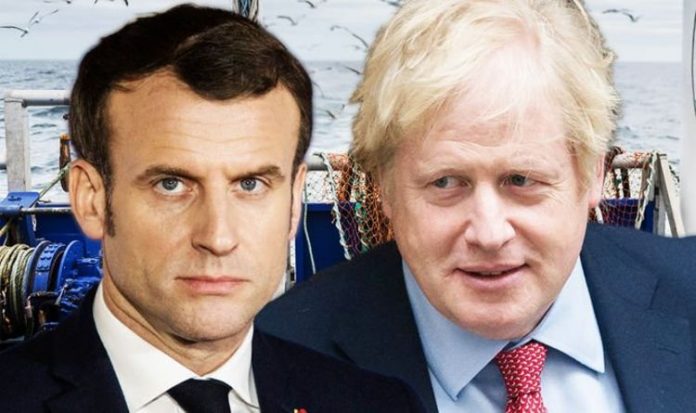The French President has emerged as a crucial figure in Brexit talks as he steps in to pile pressure on both the EU and UK. Brussels has warned the UK that it must open up its fishing waters to EU vessels if it wants access to the European markets. Mr Macron is one of eight leaders of coastal nations pressuring EU negotiator Michel Barnier not to compromise on these demands. Prime Minister Boris Johnson called Mr Macron earlier this month stressing the need for a breakthrough in talks. A Number 10 spokesman said in the call, Mr Johnson “confirmed the UK’s commitment to exploring every avenue to reach an agreement”.
They added: “He underlined that a deal was better for both sides, but also that the UK was prepared to end the transition period on Australia-style terms if an agreement could not be found.”
However, with neither side showing a willingness to compromise, and Mr Macron standing firm with his demands, a no deal Brexit looks increasingly likely.
In 2019, the head of France’s main farmers’ union warned that a no deal Brexit could have a severe impact on French agricultural exports.
Christiane Lambert of the FNSEA union said French wine and spirits producers would be hit hardest, as their sector had a £1.1billion (€ 1.2bn) annual surplus in trade with the UK.
She told broadcaster France Info that “the British are very fond of Camembert and Brie”.
Ms Lambert added: “Many exported dairy products would come back to Europe and push prices down.
“The apple sector would also be badly hit – France is the biggest supplier of apples to the UK – and then there are [French] vegetables and cereals.”
She also said that the UK would revert to “third country” status with a no deal Brexit, “and it could restrict imports – that’s our fear”.
France has an annual surplus of about £9billion (€9.86bn) in trade with the UK.
About £2.75billion (€3bn) of that surplus flows from French agricultural exports, making the UK the third-largest market for French farm goods.
READ MORE: Brexit crisis as Michel Barnier ‘caved to EU fishing demands’
It is the second-biggest market for French wine, after the US.
In 2017 France exported 281m bottles of wine and liquor to the UK, the French alcohol trade body FEVS says.
Despite record wine exports in 2019, the French Association of Wines and Spirits Exporters expressed concerns that 2020 would be a difficult year for the industry.
They said: “The 2019 positive result must not be misinterpreted: International political environment and trade tensions had a severe effect on French wines and spirits exports, suggesting 2020 will be a challenging year.
“The arbitrary sanctions that have affected our sector since October 18, [2019] threatens our development on the world’s leading market, which will have a heavy impact on exporting companies and, more broadly, on the 500,000 players in the wine sector.”
The French government has also been forced to pledge some of the £43million (€47million) from the hard Brexit fund to come to the aid of fishermen.
France is one of many EU member states where fishermen regularly fish in UK waters.
DON’T MISS
Brexit fisheries row: Macron warned of ‘Frexit threat’ if EU cave [INSIGHT]
EU free trade agreement sparked outrage in France – ‘We won’t agree!’ [ANALYSIS]
Brexit: France warned EU ‘will not take deal at ANY price’ [INSIGHT]
Between 2012 and 2016 for example, France caught 120,000 tonnes of fish worth £171million (€187million), according to Marine Management Organisation figures.
Mr Macron warned this week that Brexit will also be bad for the UK.
He said that Britain would lose more in a no deal scenario than the EU, saying the right to fish in British waters was worth €750million (£684million) to EU fishermen, but access to European energy markets was worth up to £2billion (€ 2.19bn) to Britain.
He added: “So that’s a bad deal for the UK.”
John Keiger, professor of French history and former research director of the Department of Politics and International Studies at the University of Cambridge, warned that “it’s Macron’s own people who are likely to be seriously impacted by a hard Brexit”.
In his 2019 Spectator column, Professor Keiger added: “With the French economy slowing dramatically, Macron could choose to promote a conciliatory path in the Brexit negotiations that would benefit both his own country and that of his great-grandfather.
“It’s in his – and France’s – interests for him to do so.”







